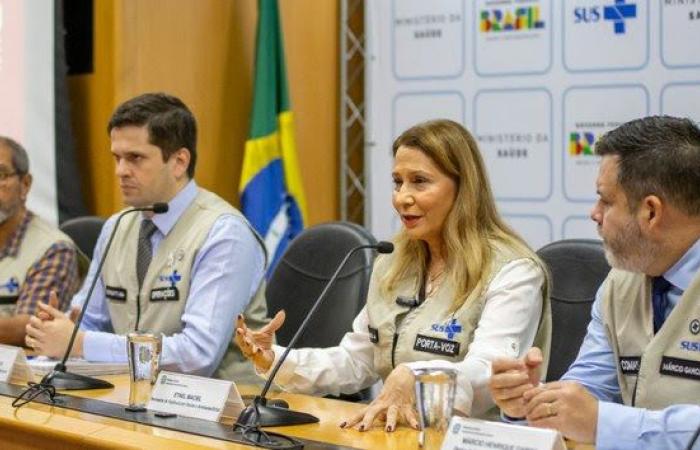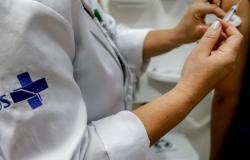The Ministry of Health defined, this Wednesday (27), the strategy for expanding vaccination against dengue. An additional 154 municipalities will be included, observing the criteria established when distributing the first batches: Health Regions with large municipalities with high transmission in the last ten years and a resident population equal to or greater than 100 thousand inhabitants, also taking into account high rates of transmission in recent months.
The vaccine is intended for people aged 10 to 14, the population that accounts for the highest proportion of hospitalizations due to the disease. The vaccination schedule consists of two doses with an interval of three months between them. The forecast is that next week the redistributed doses will begin to be used, depending on the relocation process specific to each location.
There are 668 thousand doses close to expiration date, scheduled for April 30: 523 thousand in June; and 84 thousand in July. During an interview with journalists, today (27), the director of the Department of the National Immunization Program (DPNI), Eder Gatti, explained the scheme for expanding the number of municipalities covered. “We cannot let these doses expire. Faced with this, the Ministry came up with a solution: redistribute, within the federated units, that is, within the states, to municipalities that have not yet been covered,” he said.
The relocation of doses close to expiration to municipalities within the states themselves will be detailed in a technical note to be released today. Mato Grosso do Sul will not be part of the redistribution, as all municipalities in the state were initially included. This is also the case in the Federal District – the federative unit that houses the federal capital does not have municipalities. Amapá was selected to receive the remaining doses from these federative units, considering the state’s epidemiological situation.
The new municipalities are part of 11 Health Regions:
- Central – ES
- Betim – MG
- Uberaba – MG
- Uberlândia/Araguari – MG
- Recife PE
- Apucarana – PR
- Greater Florianópolis – SC
- Guarani Aquifer – SP
- Metropolitan Region of Campinas – SP
- São José do Rio Preto – SP
- Sao Paulo-SP
More doses
The ministry received a new shipment of doses against the disease. In total, 930 thousand doses will be distributed to the 521 municipalities initially selected and to the 154 now covered by the expansion. “We will send part of these doses to replace those that were relocated in municipalities initially covered. This way, we will guarantee the continuity of vaccination in places where the dose is now due and will be redistributed. We will also guarantee doses for those municipalities that are vaccinating well, so that they can continue the vaccination strategy”, said Eder Gatti.
The ministry reinforces that vaccines are an important instrument to stop the spread of dengue in the country. However, given the limited supply of doses from the manufacturer, the focus remains on eliminating mosquito breeding sites.
Support for states and municipalities
This week, the Public Health Emergency Operations Center for Dengue and other Arboviruses (COE-Dengue) promoted six technical visits to support assistance and surveillance actions in states and municipalities. The locations were: Goiás, São Paulo (capital), São José dos Campos (SP), Ribeirão Preto (SP) and Campinas (SP), and Rio Grande do Sul. Technical visits are customized to what the state or municipality needs, for example, help with clinical management. Visits are previously agreed with municipalities and states.
To date, the Ministry of Health has released R$93.5 million through ordinances for states and municipalities that establish resources for locations that declare an emergency, whether due to dengue or other health emergencies. Transfers occur monthly. The resources are part of the R$1.5 billion reserved for this purpose.
The ministry also allocated more than R$ 300 million for the federal financial increase of the Basic Component of Pharmaceutical Assistance in the Unified Health System (SUS). The budget will be restored through a retroactive increase and includes medicines that treat dengue symptoms.
This Wednesday (27), 12 professionals were sent to work in the Basic Indigenous Health Unit – 24 hours a day. They are management technicians, doctors, nurses and care teams, who will work until April 4th in the Guarita indigenous territory (municipalities of Tenente Portela and Redentora, in Rio Grande do Sul). The decision to send technical reinforcement came after carrying out an exploratory mission in the region.
A webinar was also promoted to qualify professionals who are part of the National Hospital Epidemiological Surveillance Network (Renaveh) and other interested parties on the investigation of arboviruses, as well as a seminar with state and municipal health secretaries to discuss the development of medicines for diseases neglected.
Epidemiological scenario
As of this Wednesday (27), Brazil records 2.3 million probable cases of dengue and 831 deaths. 407 municipal and 11 state emergency decrees were published due to the disease.
The lethality of death over the total number of probable cases is 0.04% between Epidemiological Weeks 1 to 12 of this year, compared to 0.07% in the same period in 2023. As for the lethality of death over the total number of serious cases, the percentage it is 3.99% compared to 5.28% in the same period last year. The indices, therefore, indicate a reduction in the fatality rate due to the disease.






